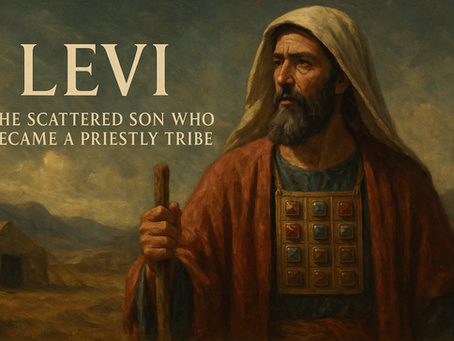top of page


Holiness in Everyday Life: Laws of Purity, Sacrifice, and Love for Neighbor
Holiness in Everyday Life: Laws of Purity, Sacrifice, and Love for Neighbor. The Day of Atonement showed Israel that God makes atonement for His people. But holiness can’t be limited to one annual ritual. Leviticus 17–19 insists that everyday life—meals, business dealings, sex, friendships—is also the arena where God’s presence is honored. Holiness is not a ceremony; it’s a lifestyle.
2 min read


Azazel, Not “Scapegoat”: What Leviticus 16 Really Says and Why It Matters
Azazel, Not “Scapegoat”: What Leviticus 16 Really Says and Why It Matters. Words shape theology. Call the live goat in Leviticus 16 a “scapegoat,” and you’ll imagine a patsy punished for everyone else’s crimes. But the Bible’s Hebrew points another direction: Azazel (עֲזָאזֵל). This isn’t about blaming an innocent animal; it’s about God removing defilement from His people and banishing it from His camp.
4 min read


The Day of Atonement: Scapegoat, Azazel, and the Blood that Covers Sin
The Day of Atonement: Scapegoat, Azazel, and the Blood that Covers Sin. After the shocking deaths of Nadab and Abihu, God gave Israel a way to live with His holiness without dying. Leviticus 16 introduces the Day of Atonement—Yom Kippur—a once-a-year reset for the nation’s sin. Far from an obscure ritual, it foreshadows Jesus’ once-for-all sacrifice and the final removal of sin.
4 min read


Eleazar & Ithamar: Faithful Priests Who Continued Aaron’s Line
Eleazar & Ithamar: Faithful Priests Who Continued Aaron’s Line. Eleazar and Ithamar, the surviving sons of Aaron, carried forward Israel’s priesthood after their brothers Nadab and Abihu were judged. Their obedience and perseverance helped preserve the worship of God among the Israelites during the wilderness journey and beyond.
2 min read


Nadab & Abihu: Priests Consumed by Strange Fire
Nadab & Abihu: Priests Consumed by Strange Fire. Nadab and Abihu, the two oldest sons of Aaron, were appointed as priests to serve in Israel’s newly built tabernacle. Yet their story became a sobering warning about approaching God on our own terms.
2 min read


The Fire of God: Nadab and Abihu and the Danger of Strange Fire
The Fire of God: Nadab and Abihu and the Danger of Strange Fire. The priesthood had barely begun when disaster struck. Aaron’s two oldest sons, Nadab and Abihu, entered the holy space with fire of their own making. One moment they were offering incense; the next they were dead. Leviticus 10 records this shocking event, warning every generation that drawing near to God on our own terms is deadly serious. Worship isn’t a freestyle jam session. It’s life or death.
3 min read


Aaron’s Ordination and the Consecration of Priests: Holiness in Blood and Oil
Aaron’s Ordination and the Consecration of Priests: Holiness in Blood and Oil. God’s presence in the tabernacle required more than beautiful design; it demanded holy ministers. Exodus 28–29 and Leviticus 8–9 describe how Aaron and his sons were set apart as priests. Their ordination reveals how sinful people can stand before a holy God—and how Jesus fulfills and surpasses that priesthood.
2 min read


Levi: The Scattered Son Who Became a Priestly Tribe
Levi: The Scattered Son Who Became a Priestly Tribe. The story of Levi is one of violent beginnings transformed into a sacred calling. Though he first appears as a man marked by wrath and bloodshed, God’s redemptive plan reshaped his descendants into the priestly tribe of Israel. Levi’s legacy reminds us that God can turn even the most broken past into a vessel for holiness and service.
4 min read


Leviticus Summary: Holiness in the Details
Book of Leviticus: Holiness in the Details. Leviticus is the Bible book where most reading plans go to die. Let’s be honest: the animal guts, skin diseases, and mold inspections can feel overwhelming. But if you skip this book, you’re missing the blueprint of holiness and the foundation of sacrifice. Every offering, every law, every ceremonial step was a shadow cast by Christ.
5 min read
bottom of page